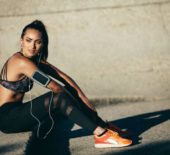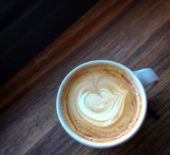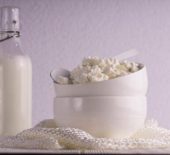Do you want to maximise the results you achieve from a workout and feel your best during training? Then this blog is a must read.
Before a working out it is important to include two components. Firstly, fuel your muscles for the activity with carbohydrates. Carbohydrates break down into glucose which the muscle cells use for energy. Not all carbohydrates may be equal here. Aim for a low fibre carbohydrate source to prevent gut discomfort. Some ideas to get you started are:
- Fruit smoothie
- Sough dough rye toast (more easily digested than regular wheat-based bread) + banana + honey
- Raisin toast + jam
- Tub of creamed rice + canned fruit
- Tin of sweetcorn
Secondly, without drinking enough fluid your body will suffer. Only a small amount of dehydration effects your entire body and its ability to function. Try drinking moderate amounts of fluid prior to a workout. A goal is to ‘not go for gold’, when you do go to the bathroom check the colour of your urine. Very yellow or gold means you are not drinking enough, try aiming for a clearer colour to ensure you are optimally hydrated for your workout. Water is the optimal selection for hydrating but low or no fat milk, 100% fruit juice, coffee, tea and sports drinks also counts as fluids.
On top of choosing a pre workout meal low in fibre, lower fat options should also be the goal as a meal higher in fat can lead to stomach upset. Remember to leave enough time to allow what you have eaten to be digested. No one likes the feeling of exercising on a full stomach, try leaving 2-3 hours before workout or competition for your last meal.
If needed a small top up 60 minutes prior like honey and rice cakes or a banana. If you know you cannot tolerate a certain food or drink before exercise, don’t eat it or drink it! Give your body a fighting chance to be ready for exercise rather than sabotage yourself before you have even started.
If you are someone who gets ravenous mid workout, try including a protein into your pre workout meal like peanut butter, nuts, low fat yoghurt or low fat milk or cheese. The form of carbohydrate food or drink you choose will also effect this. A low glycemic carbohydrate will release energy slower and help you feel fuller for longer.
After working out aim for these three key components in your meal:
Protein
This can be in many sources like tuna, yoghurt, nuts, eggs, lean meats or milk. Contrary to common beliefs in the weight room, more does not mean better and you only need roughly 20-40g after a workout before the body excretes the remaining in urine or stores as fat.
Carbohydrate
A steady releasing source (meaning potentially more fibre) is good to aim for, this will also help you feel fuller for longer after the meal and prevent you from eliminating everything in the pantry because you feel so hungry after the work out.
Some meal options including carbohydrate which will release its energy more steadily include:
- Wholegrain bread or wraps with some ricotta cheese and salad
- Weetabix with low or no fat milk
- Brown rice or pasta with some tuna and non-starchy vegetables like spinach capsicum and tomato
- Smoothie
- Yoghurt with granola
Fluids
Hydrate! If you exercise intensely for over an hour or sweat a lot this may mean replacing electrolytes as well. Aim to replace more than the fluid you lost by 125-150% ideally within the next 4-6 hours after your workout. This can be achieved by weighing yourself before and then after your workout to determine how much fluid you have lost.
Prepare for the next session
If you plan to exercise again that day then eating to recover as well as to fuel for the next training session requires time management. If you are exercising once in a day the time you eat your post workout meal is more relaxed and can lead into the next meal.
Take home message: You now have the knowledge to eat for success and optimise your body’s ability tp perform, recover and to achieve optimal results.
References:
- Miller SL, Tipton KD, Chinkes DL, Wolf SE, Wolfe RR. Independent and combined effects of amino acids and glucose after resistance exercise. Med Sci Sports Exerc. 2003;35(3):449-55. Abstract available from: http://www.ncbi.nlm.nih.gov/pubmed/12618575
- Tipton KD, Ferrando AA, Phillips SM, Doyle D Jr, Wolfe RR. Postexercise net protein synthesis in human muscle from orally administered amino acids. Am J Physiol. 1999;276(39):e628-34. Available from: http://ajpendo.physiology.org/cgi/content/full/276/4/E628
- Ivy JL, Katz AL, Cutler CL, Sherman WM, Coyle EF. Muscle glycogen synthesis after exercise: effect of time of carbohydrate ingestion. J Appl Physiol. 1988;64(4):1480-5. Abstract available from: http://www.ncbi.nlm.nih.gov/pubmed/3132449
- Ivy JL, Lee MC, Brozinick Jr JT, Reed MJ. Muscle glycogen storage after different amounts of carbohydrate ingestion. J Appl Physiol. 1988;65(5):2018-23. Abstract available from: http://www.ncbi.nlm.nih.gov/pubmed/3145274
- Below PR, Mora-Rodriguez R, Gonzalez-Alonso J, Coyle EF. Fluid and carbohydrate ingestion independently improve performance during 1 h of intense exercise. Med Sci Sports Exerc. 1995;27(2):200-10. Abstract available from: http://www.ncbi.nlm.nih.gov/pubmed/7723643
- Okano G, Sato Y, Takumi Y, Sugawara M. Effect of 4h preexercise high carbohydrate and high fat meal ingestion on endurance performance and metabolism. Med Sci Sports Exerc. 1996;17(7):530-4. Abstract available from: http://www.ncbi.nlm.nih.gov/pubmed/8912069
- Wu CL, Williams C. A low glycemic index meal before exercise improves endurance running capacity in men. Int J Sport Nutr Exerc Metab. 2006;16(5):510-27. Abstract available from: http://www.ncbi.nlm.nih.gov/pubmed/17240783
- No authors listed. Position of the Academy of Nutrition and Dietetics, Dietitians of Canada, and the American College of Sports Medicine: Nutrition and Athletic Performance. Can J Diet Pract Res. 2016 Mar;77(1):54. doi:10.3148/cjdpr-2015-047. Abstract available from: http://www.ncbi.nlm.nih.gov/pubmed/26917108
- Antonio J, Sanders MS, Ehler LA, Uelmen J, Raether JB, Stout JR. Effects of exercise training and amino-acid supplementation on body composition and physical performance in untrained women. Nutrition. 2000;16(11-12):1043-6. Abstract available from: http://www.ncbi.nlm.nih.gov/pubmed/11118822
- Australia SD. Sports Dietitians Australia Australia: SDA; 2017 [cited 2017 07/07/2017]. Available from: https://www.sportsdietitians.com.au/factsheets/fuelling-recovery/fluids-in-sport/.






